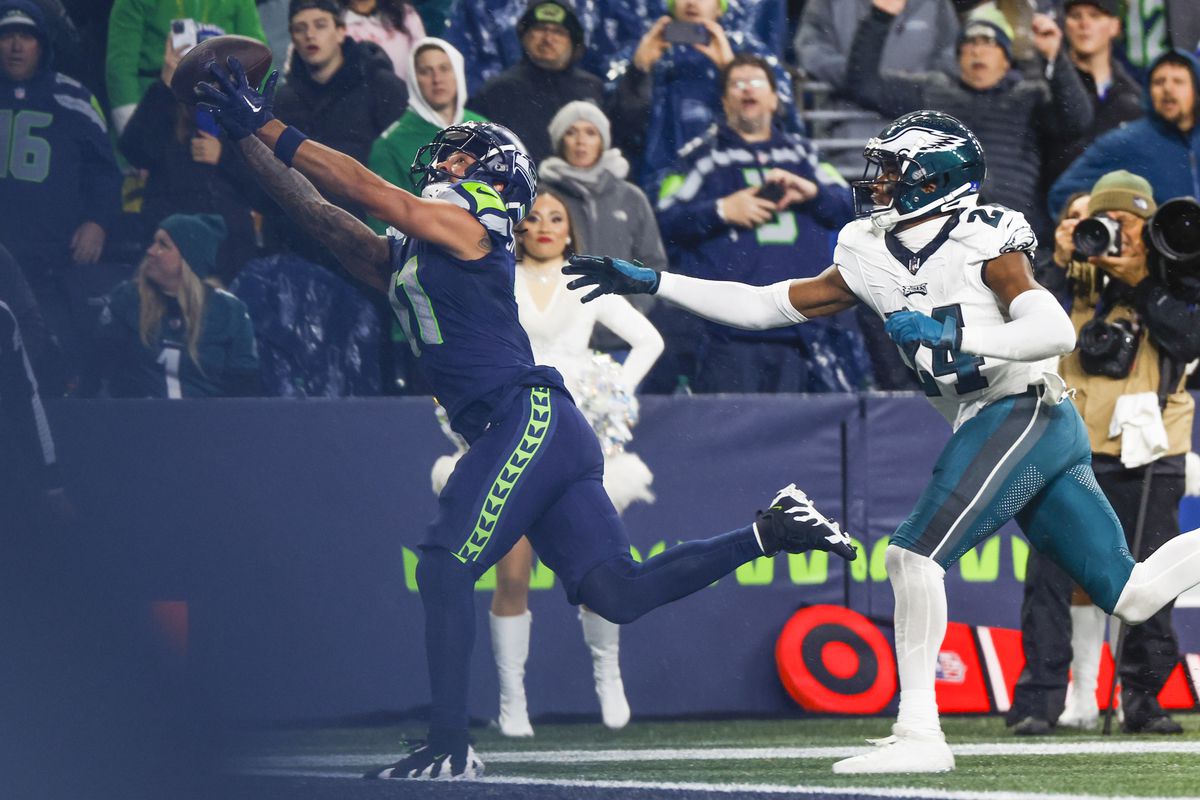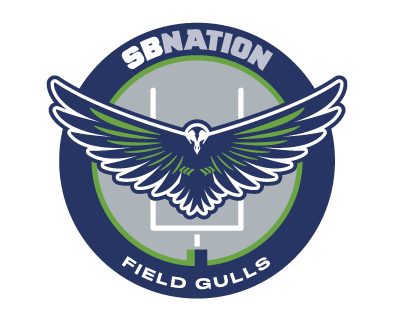
Jaxon Smith-Njigba surprised us long before he even stepped onto the field. As mentioned above, he was the first receiver picked in the first round by John Schneider and Pete Carroll. In fact, the Seattle Seahawks haven’t drafted a WR in the first round since 2001 (Koren Robinson). That was the longest active streak in the NFL without a WR in the first round. Green Bay (Javon Walker, 2002) now tops that list.
Smith-Njigba broke other “laws” of our front office when we look at his Combine/Pro Day numbers. The team has always had its thresholds for draft picks. However, WR has always been the position where the team has had the least criteria. Basically, the team picks WRs who run the 40-yard dash in the 4.4s range. They only picked three receivers who didn’t run a 4.4 – Kenny Lawler (4.64), Chris Harper (4.50) and John Ursua (4.56). Remember that Lawler and Ursua were seventh-round picks and Harper was a fourth-rounder.
JSN only ran the 40-yard dash at Pro Day (remember, these are not reliable numbers like those at the Combine), and the numbers ranged from a high 4.4 to a low 4.6, with a consensus of 4.52s. Therefore, it would be fair to project that the real number would exceed the 4.4s value.
If he didn’t impress in the 40-yard dash, we can’t say the same about the agility drills. He ran a short shuttle of 3.93s (97th percentile) and a three-cone drill of 6.57s (96th percentile). For comparison, former Seahawks player Doug Baldwin, who is underrated by the league, had a short shuttle of 4.26s and a three-cone drill of 6.56s.
With these numbers and watching his tape, it was easy to project JSN as a machine in the slot. But, as a Seahawk, he surprisingly showed more as an outside receiver than playing inside.
Let’s review his rookie season!
Stats
The majority of his snaps came in the slot when compared to wide (456 vs. 214). In only one game out of the sixteen he played did he line up more on the outside than on the inside. That was in Week 7 against the Cardinals when he was 16 vs. 22.
Jaxon Smith-Njigba MAGIC pic.twitter.com/3eNl2Csjsl
— Alexandre Castro (@alexcastrofilho) July 3, 2024
Completing his numbers, he had 90 targets for 63 receptions, 628 yards, and 4 TDs. He earned 29 first downs, forced six missed tackles, and gave his QB a 95 rating when targeted.
Where was it better than we expected?
As stated at the beginning of this article, JSN was projected to be a slot-only player coming into the NFL and would not be a deep threat. He produced very well as an outside receiver. If we break down the receiving zones into: behind the LOS, 0-9 yards, 10-19 yards, and 20+, most of his yards came deep (170, plus 3 TDs). This is excellent, since in the NFL you have to find ways to keep your opponent guessing.
Jaxon Smith-Njigba awareness pic.twitter.com/PHmPICUXFU
— Alexandre Castro (@alexcastrofilho) July 3, 2024
He lines up at the top of the screen and is followed by the CB. In addition, the safety is double-marking him. When he realizes that the safety is giving too much respect to the deep threat, he takes advantage of the space left and makes the catch.
Jaxon Smith-Njigba catch pic.twitter.com/yBZ1sP0bxt
— Alexandre Castro (@alexcastrofilho) July 3, 2024
He uses a vertical release and the CB reacts by preparing to mark deep. JSN runs a slant and makes the important reception.
Jaxon Smith-Njigba for the first down pic.twitter.com/NXM1jdJ3yC
— Alexandre Castro (@alexcastrofilho) July 3, 2024
Once again he attacks the outside of the CB and when he commits to defending him, he comes inside. The good play doesn’t end there. JSN sets his sights on the back of the field to hold the safety and give him space to receive in the middle of the field in a crucial play for the victory against the Titans.
Jaxon Smith-Njigba for the WIN pic.twitter.com/o8FSUSRziI
— Alexandre Castro (@alexcastrofilho) July 3, 2024
If you told me that JSN would give us a win with a deep catch and a contested reception, I would doubt it. On this play, the Eagles have two safeties deep downfield, but when the snap comes, one of the safeties drops downfield and focuses on the backfield. This leaves the WR in a 1v1 situation with the deep safety far away from the play. He wins the route and makes the catch with his fingertips to give us the win in an incredible game.
Where was it worse than we expected?
One of the first negative surprises was his drops. At Ohio State he was synonymous with safety, but he had 8 drops in his freshman season, with 11.3% and was the fourth-worst receiver in that category.
Jaxon Smith-Njigba drop pic.twitter.com/Sfv3lEq3gO
— Alexandre Castro (@alexcastrofilho) July 3, 2024
I don’t even like to remember this terrible loss against the Ravens, but let’s move on. This play was on third down and JSN had the ball in his hands to convert, but he was already thinking about turning to run and ended up dropping the ball.
Jaxon Smith-Njigba unsharp route pic.twitter.com/qKxlhi0AsU
— Alexandre Castro (@alexcastrofilho) July 3, 2024
Smith-Njigba is a prolific route runner. However, he didn’t give us any free lessons on releases and routes. On this play, he runs a more rounded route, instead of making a 90-degree cut (as he should be). This causes him to lose timing, as he also doesn’t slow down, and allows the DB to react and almost make the interception.
What can we project for 2024?
Ryan Grubb worked with three excellent receivers in Washington: Rome Odunze, Jalen McMillan and Ja’Lynn Polk, similar to our group of DK Metcalf, Tyler Lockett and now JSN. If I were to draw a comparison between the former Huskies, I think he will use Jaxon in a similar way to McMillan.
Jaxon Smith-Njigba exploring LBs pic.twitter.com/ngSlRJYJmE
— Alexandre Castro (@alexcastrofilho) July 3, 2024
In addition to attacking the field in depth, McMillan was responsible for working the middle of the field. JSN must be a nightmare attacking the backs of the LBs. In this play, one of the offensive routes forces the LBs to advance and he takes advantage of the space between them and the safeties.
Jaxon Smith-Njigba YAC pic.twitter.com/2tz6JclGAa
— Alexandre Castro (@alexcastrofilho) July 3, 2024
This play was very well designed and allowed JSN to use another of his strengths: yards after the catch. He is sent in motion to the sideline, indicating a man-mark. Meanwhile, Colby Parkinson (we will miss him) runs a “shield” route to protect JSN’s route. The WR runs a whip route and makes the catch. He has an incredible ability to switch from receiver to ball-carrier while looking downfield to gain more yards.
WR screen pic.twitter.com/doUgaFoWEi
— Rapinas do Mar (Cortes) (@cortesrapinas) February 16, 2024
The offense should run a lot of screens and JSN should be an important part of that. Last year he already showed that he has this ability and, after so long, we were able to threaten with this type of play. The trend is for things to improve with Grubb, but it will be a challenge for the OL (as we discussed in the Olu Oluwatimi x Nick Harris article).
Jaxon Smith-Njigba on screen pic.twitter.com/rphp6AwoUF
— Alexandre Castro (@alexcastrofilho) July 3, 2024
Final Thoughts
It's natural to project a better year in terms of numbers for Jaxon. It's worth remembering that in his first year he suffered a hand injury and we suffered with injuries to Charles Cross and Abe Lucas that made us play in more packages with 2 and 3 TEs, thus taking snaps away from JSN.
But, in the second half of the season this stabilized a bit and allowed Geno Smith to improve the synergy with the WR. Next year we will have an older Tyler Lockett and maybe that will affect his production. Thinking about this transition the team can start giving more targets to Smith-Njigba.

Loading comments...